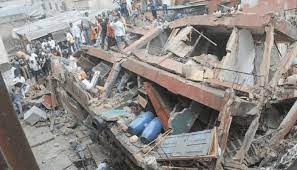According to the World Bank, the frequent collapse of buildings in the state of Lagos is caused by gaps and loopholes in the process of obtaining building permits, as well as the employment of unqualified specialists in the design and construction of buildings.
In addition, it identified the absence of a legally accepted building design code, the restricted area accessible for development, and the lack of processes to ensure the quality of construction materials as some of the major reasons structures frequently cave in around the state.
This information was provided by the bank in a report that examined the regulatory framework criteria for housing in sub-Saharan Africa.
The bank reports that only approximately ten percent of building sites ever receive licences, and even when permits are secured, the final construction can still differ from the terms of the permission.
Read also: 10 Southern African fintech startups secure funding from World Bank
Lagos publishes Study on building collapse
In January of this year, the Lagos State section of the Building Collapse Prevention Guild published a study which stated that there had been 115 instances of buildings collapsing in the nation’s capital during the course of the previous decade.
A portion of the report read, “Based on past studies and consultations with the government and key stakeholders, the main drivers for building collapse in Lagos are the absence of a legally adopted building design code in Lagos State. This contributes to poor quality design and construction, increasing vulnerability and reducing building design life.
“Another reason is the limited land available for development, combined with a lack of risk-informed site selection. As land in Lagos is scarce, some builders, particularly the poor, are forced to choose risky sites for construction. In addition, site-specific risk information is not readily available.
“Lack of systems to ensure the quality of construction materials: Materials in the marketplace often do not meet the Nigerian national standards, which include minimum material standards, certification mechanisms, and testing requirements. In addition, material testing facilities in Lagos have limited capacity.”
The bank believes that a lack of regulation is to blame for the collapse of buildings that take place during the wet season as a consequence of construction taking place on unsuitable locations and/or water damage to the foundations and structures of the buildings.
In addition to this, it was emphasised that the authority in charge of building control did not have sufficient resources, including transportation and equipment, to carry out site monitoring and inspection in an efficient manner.
The World Bank suggested a collaboration between the government and the private sector in addition to bottom-up outreach to enlighten people about the dangers associated with low-quality construction and design as a solution to this problem.
The World Bank
The World Bank is a group of 187 countries that work together to help grow countries. Its job is to reduce poverty by giving money to the governments of its poorer members so they can improve their businesses and raise the standard of living for their people.
The World Bank works to improve long-term economic growth and reduce poverty by giving countries technical and financial help to carry out reforms or projects like building schools, getting water and energy, fighting disease, and protecting the environment.
The bank’s main office is in the U.S. city of Washington, D.C. The World Bank is led by a president, 25 executive directors, and 29 vice presidents as of 2022. The IBRD has 189 member countries, and the IDA has 174. Ajay Banga is the CEO of the World Bank.
Nigeria is run by Shubham Chaudhuri, who is in charge of that country. Before his present job, he was in charge of Afghanistan for the World Bank.




